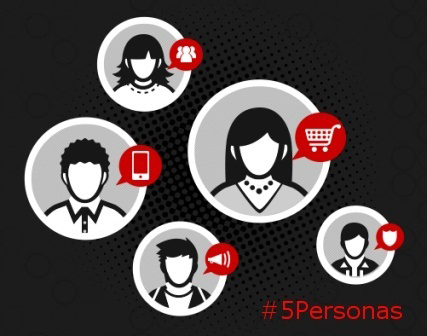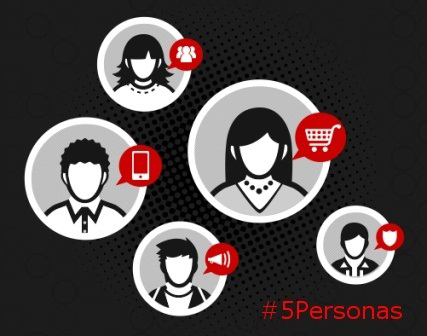PURCHASE, N.Y.--(BUSINESS WIRE)--Is there really such a thing as an online persona? According to a new global study from MasterCard (NYSE: MA) released today, the answer is, yes. The Digital Sharing and Trust Project shows that consumers actually shed their “real-world” identities when they go online to assume “digital personas” that better reflect how they feel, what actions they take around their personal information and how much value they place on their own data. These five personas –Open Sharers, Simply Interactors, Solely Shoppers, Passive Users and Proactive Protectors—are spread evenly throughout the global population and ignore any regional or demographic boundaries.
“Nearly 2.5 billion people around the globe use the Internet every day,” said Theodore Iacobuzio, Vice President of MasterCard’s Global Insights group, which produced the study. “This research shows that regardless of who they are and where they live, they all share something in common when it comes to how they act and behave online –these five unique global personality types. It also shows us that when consumers go online, characteristics such as age, gender or nationality become secondary and they instead assume a sense of what we refer to as ‘social citizenship’.”
Though consumers are increasingly savvy in managing their online identity, the consumer research reveals there is a clear hierarchy in the kind of information they are willing to share, and there are certain types of organizations they trust most with their data. Some of the key findings about each online persona group include:
- “Open Sharers”: Twenty-one percent of online consumers fall into this category, which tends to skew more male (60 percent). Open Sharers are the most highly digital group of the five and tend to lead less risk-averse online activities. Half of them are online more than 10 times per day and when they share their personal information, they expect deals, access and offers in return.
- “Simply Interactors”: This persona (which accounts for 21 percent of online consumers) includes some of the most dedicated social networkers, yet they are not particularly tech-savvy consumers. When it comes to online shopping, a majority (80 percent) will research products online, but 63 percent still prefer to shop in person. Though they are aware of targeted marketing, they don’t see their data as valuable and thus don’t express significant concern about it.
- “Solely Shoppers”: This online personality is characterized by their reliance on the Internet for savvy shopping research and purchases. Making up 21 percent of all consumers online, the majority (90 percent) of these Internet users researches products online before buying and half use their mobile phone to price check in-store in order to get the best deals. Surprisingly, they have low awareness of target marketing – as only 37 percent know that social media sites use their personal data to inform ads.
- “Passive Users”: As the name suggests, this group’s members are not fully convinced of the Internet’s value and therefore tend to spend the least amount of time online of all the personas. Accounting for 20 percent of all online consumers, Passive Users are less frequent on social networks (only 48 percent) and not heavy online shoppers. Compared to other personas, they are more likely to shop from their mobile device and more willing to trade their data for something in return.
- “Proactive Protectors”: Comprising 17 percent of all online consumers, the Proactive Protectors are highly aware of targeted marketing – in fact 82 percent are knowledgeable that marketers can target them based on their search and browsing history. They are unlikely to use social networks and the most guarded with their privacy settings of all the personas – taking steps to protect and control their digital footprint.
Additional study findings that are true across all online personas include:
- Consumers Know What They’re Worth: According to the research, 64 percent of consumers believe their personal data has value to merchants and advertisers.
- Most Consumers are Savvy with Privacy Settings: The study revealed 60 percent of consumers know how to change the privacy settings on their web browser.
- Consumers Enjoy Customized Offers in Return for Sharing Info: A majority of consumers (55 percent) appreciate when companies tailor offers to them based on the information they share.
- Consumers Embrace “Showrooming”: Nearly half (49 percent) of consumers check prices on their mobile devices when in-store to make sure they are getting the best offers.
“In today’s digital world, consumers are continuing to spend more of their time and money online,” said Iacobuzio. “That’s all the more reason that understanding these five distinct personas will be important for a variety of audiences, but perhaps most especially for retailers and marketers. By better understanding why consumers want to share their information online in the first place, companies can be better prepared to engage with them in more meaningful and relevant ways.”
Consumers who are curious to find out their online personas can take a brief quiz to find out. For more detailed findings, visit the interactive website and research report titled, “Around the World in Five Personas,” which will be discussed during a panel session at the World Retail Congress in Paris on Monday, October 7, 2013 at 12:45 PM Central European Time.
Methodology
MasterCard conducted both qualitative and quantitative consumer research between November 2012 and March 2013 in nine markets: the United States, Canada, Germany, United Kingdom, India, South Africa, United Arab Emirates, Brazil and Colombia. The study included a survey of more than 9,000 digital consumers aged 16-65, all of whom engaged in some type of online activity at least once a week. The five unique online personas emerged out of a vigorous statistical examination, which grouped respondents together based on the similarity of their answers to questions across six dimensions: 1) awareness of targeted marketing; 2) social networking; 3) online shopping; 4) mobile sophistication; 5) privacy management; and 6) data as currency.
About MasterCard
MasterCard (NYSE: MA), http://www.mastercard.com, is a technology company in the global payments industry. We operate the world’s fastest payments processing network, connecting consumers, financial institutions, merchants, governments and businesses in more than 210 countries and territories. MasterCard’s products and solutions make everyday commerce activities – such as shopping, traveling, running a business and managing finances – easier, more secure and more efficient for everyone. Follow us on Twitter @MasterCardNews, join the discussion on the Cashless Pioneers Blog and subscribe for the latest news.




